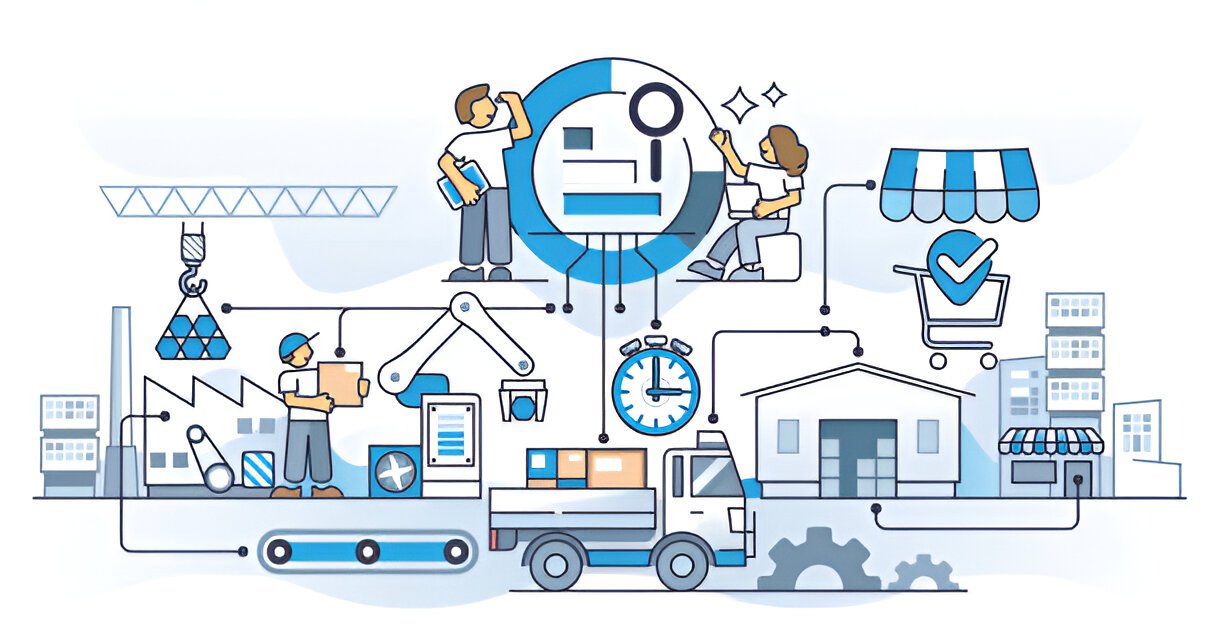
Your Amazon business cannot succeed without good-quality products from a trustworthy manufacturer. Whether you are creating your own brand or selling wholesale, choosing the right manufacturer is very important. A good manufacturer provides consistent products, keeps customers happy, and helps you make a profit. However, finding the right manufacturer and sourcing products can be tricky. This guide will help you understand how to do it easily.
Evaluating Your Product Requirements
For a smoother experience searching for a manufacturer, set your product requirements in advance. Ask yourself the following questions:
Material & Quality Standards: What materials and levels of durability must the product meet?
Target Audience: What do potential customers expect so that the product can meet their needs?
Cost & Profitability: What is an appropriate budget for a competitively priced product that would still yield profit?
Legal & Compliance Requirements: Does the product adhere to Amazon’s policies and requirements for legal compliance?
Reliable Manufacturers: Where to Look
1. Alibaba
A marketplace that connects businesses with international manufacturers is called Alibaba. The best thing about it is that it has thousands of suppliers selling a myriad of products. Here is how to make the best out of it: Look for suppliers who have Gold Supplier, Verified, or Trade Assurance badges. These are assurance tags that verify those suppliers.
Analyze the suppliers by checking their price quotes against the minimum order quantities (MOQs) and lead times.
Request sample orders for validation of quality before placing a bulk order
2. Global Sources
Global Sources is basically a vendor. Global vendor is comparable to Alibaba in that it connects buyers to suppliers, predominantly across Asia. Key asset includes:
Suppliers ensure guarantee verification.
Capable of producing overviews of suppliers provided for better understanding.
Positive for sourcing electronics, clothing, and other home accessories.
3. Expos & Trade Shows
Trade fairs give you an opportunity to interact with manufacturers directly to help you assess product quality and consequently nurture relationships with them. Noteworthy shows:
Canton Fair = China’s largest trade fair, which ranges over a number of industries
Global This is a Hong Kong Expo electronic gifts and fashion centric
National Hardware Show, USA hosted, centers on tools and home improvement
4. Contacting Factories Directly
Eliminating third parties from a purchase may minimize spending. For this purpose, connecting through:
Kompass (Europe) and IndiaMART (India) served as directional suppliers, whereas Thomasnet serves as a US directory.
Factory owners can be contacted through social platforms such as LinkedIn
Industrial contacts
5. Agents/Intermediaries
Assist in searching for manufacturers, negotiating prices, and supervising the quality of produced goods. Particularly helpful when selling for the first time. Recommended features that made adopting a sourcing agent appealing are:
Widely known manufacturers
Language communication issues
Logistic and control issues are easier to organize.
Evaluating Reliability of a Manufacturer
After narrowing down possible manufacturers, rate each based on the following:
1. CompanyBackground and Reputation
Examine the company profile, time in industry, and their clients’ testimonials.
Check business registration and certifications.
Watch out for warning signs such as incomplete contact information or unresponsive representatives.
2. Product Samples and Quality Testing
Always request product samples for assessment of the build quality, the materials used, as well as the finishing.
If need be, independently test for safety and compliance with specified requirements.
Draft a decision after evaluating samples from other suppliers.
3. Production Capacity & Scalability
Find out if the manufacturer will be able to meet your demand as your business expands. Ask about:
Lead time for bulk orders.
Production capacity.
Whether they are able to cope with increased order volumes.
4. Pricing & Payment Terms
Discuss the price while evaluating the offered quality as well as the prospects of working together.
Ask for detailed bids that breakdown the price into materials, work, and transportation.
Determine terms of payment (for instance, 30% after placing an order and 70% with shipment).
Pay through reliable channels such as Trade Assurance (on Alibaba) or use Escrow services.
5. Quality Control & Compliance
Clearly specify your quality control requirements and check the goods before shipment.
Engage third-party inspection companies such as SGS, Bureau Veritas, or TUV Rheinland.
Mitigate defects by setting acceptable quality limits (AQL).
Make sure that the products meet the safety and packaging criteria required by Amazon.
Managing Shipping & Logistics
After negotiating a contract with your supplier, ensure that your methods of shipment and logistics management are properly constructed.
1. Methods of Shipment and Transportation
Air freight is commonly used for urgent shipments; it is, however, quite expensive.
Sea freight is not as fast as air freight, but it is cheaper for larger volumes.
DHL, FedEx, and UPS are useful courier services for smaller shipments and sample orders.
2. Customs and Import Duties
Always check customs regulations for the marketplace you are targeting, whether it is the US, UK, or EU.
Be sure to consider tax and duty costs as well as needed certifications for CE, FCC, or FDA items.
3. Fulfilled by Amazon Vs. 3rd Party Logistics
Fairly easy to set up. Amazon is then responsible for all the storage, fulfillment, and even return tickets.
3PL warehouses are perfect for bulk storage and greater savings before sending stock to Amazon.
Building Strong Supplier Relationships
Good relationships with manufacturers are the guarantee of long-term success.
Communicate: Manage expectations— quality, deadlines, cost, etc.
Be Professional & Ethical: Always pay invoices on time.
Negotiate: Refresh pricing and minimum order quantity periodically.
Factory Visit: Nothing builds trust better than actually visiting the factory.
Conclusion
Building an Amazon business hinges on finding reliable manufacturers and vendors. With efficient logistics and thorough supplier evaluation, trade fairs, and online platforms form the basis of brand building while guaranteeing product quality. For sustained growth in the highly competitive world of Amazon, forming long-term relationships with trusted manufacturers needs to be prioritized.
FAQ:
1. Where can I find reliable suppliers and manufacturers for vendors from Amazon?
Reliable suppliers can be found on SaleHoo, Alibaba, ThomasNet, and Global Sources. Trade shows,along with industry forums and networking, can be used along with sourcing agents to find vendors.
2. How do I check the credibility of a manufacturer’s business
Credibility can be verified on visions by sifting through comments, reviews, and certifications. Sample orders along with factory visits and audit transactions can give a clear idea of credibility.
3. What criteria need to be taken into account when dealing with manufacturers?
Consider pricing and quality control measures along with compliance with Amazon’s product requirements and response times. Always check if the manufacturer has experience with producing the desired products.
4. What steps can I take to guarantee the quality of the products I intend to buy in bulk?
Obtain samples of the products of interest prior to purchasing in bulk. Moreover, hire independent quality control agencies to evaluate the products’ quality and uniformity prior to shipment.
5. What are the usual modes of payment with regard to manufacturers?
Paypal, wire transfer, Alibaba Trade Assurance, and Letters of Credit (L/C) are some of the payment methods accepted. Always use these methods of payment when possible, as they provide you with security and minimize risks.
6. What is the best approach to obtaining lower prices from manufacturers?
Place bulk orders, shop around with many suppliers, and long-term business contracts. Ask for discounts politically, but be firm and place an order for greater quantity or longer duration contracts with the suppliers.
7. Is it advisable to employ a soursing agent or to deal directly with a manufacturer?
While these agents come with additional fees, they find reputable suppliers for you, negotiate prices, manage logistical arrangements for your business. If you have experience with manufacturers, then dealing directly can be more economical.
8. How do I ensure that my product design and brand are safeguarded when dealing with manufacturers?
Before sharing information such as designs and product specifications, enter into Non-Disclosure Agreements (NDA) coupled with Non-Compete Agreements (NCA). You may also consider counter-branding your brand, will make it registered and thus no one can counterfeit it
9. What steps should I take if I encounter poor-quality or damaged products?
Reach out to the seller right away and supply them with proof. If the seller does not help resolve the issue, you can file a dispute with Alibaba or your payment method. A detailed contract that specifies refund or replacement terms helps immensely in these types of scenarios.
10. What can be done to make sure my sourced products are compliant with Amazon’s policies?
Recheck the compliance guidelines set by Amazon because they contain safety, certification, and restricted category requirements. The more experienced suppliers with whom you work can save you from countless listing problems, as long as they understand Amazon regulations.





